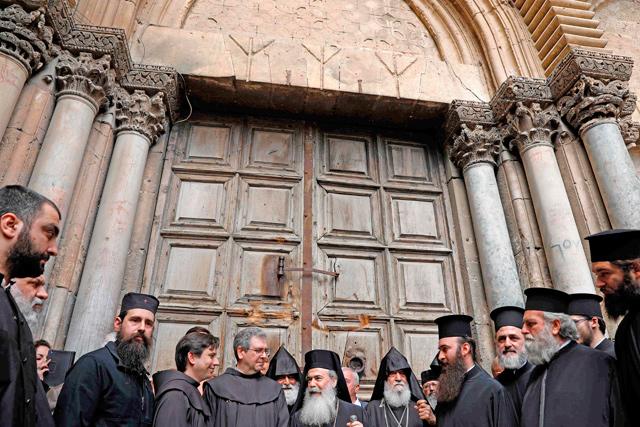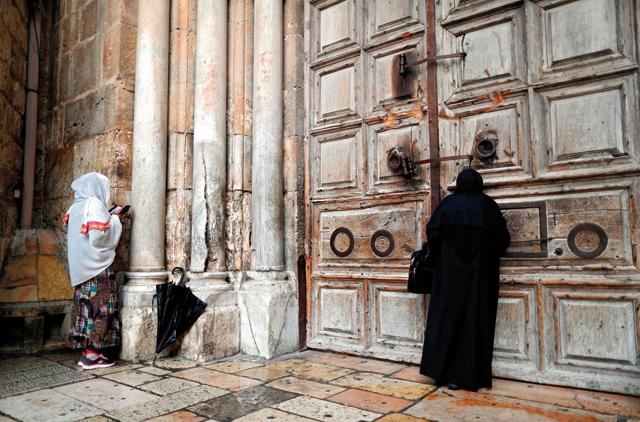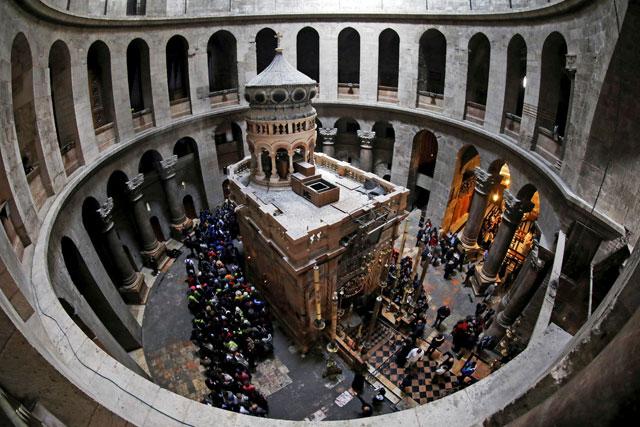You are here
Jordan condemns Israeli occupation’s heavy taxes on churches
By JT - Feb 25,2018 - Last updated at Feb 25,2018

Greek Orthodox Patriarch of Jerusalem Theophilos III delivers a statement to the press as he stands next to the Custodian of the Holy Land Fr. Francesco Patton and Armenian Bishop Siwan (left), on Sunday, as they stand outside the closed doors of the Church of the Holy Sepulchre in Jerusalem's Old City (AFP photo)
AMMAN — Jordan on Sunday condemned the recent Israeli measures against Jerusalem's churches and their properties, the Jordan News Agency, Petra, reported.
State Minister for Media Affairs Mohammad Momani expressed the Kingdom's rejection of the "systematic" measures by the Israeli authorities to alter the historical and legal status quo that exists in the holy city including the confiscation of properties and bank accounts of the city's churches by the so-called "Jerusalem Municipality" under the pretext of not paying dues.
Momani, who is also the government's spokesperson, said that such measures target the historical existence of Christians, who are a key component of Jerusalemites.
The minister underscored the Kingdom's solidarity with the churches, which announced the closure of the Church of the Holy Sepulchre in protest against the Israeli measures.
The official demanded the Israeli government to reverse the decisions and respect its commitment to international laws, which label Israel as the occupying force in East Jerusalem.
Momani stressed that Jordan, in its capacity as custodian of the Muslim and Christian sites in Jerusalem, will continue efforts aimed at enhancing the steadfastness of the Palestinians and protecting the holy places.
He pointed out the Israeli draft laws that are being discussed currently and aim to confiscate lands of churches in Israel and the Palestinian territories.
Christian leaders took the rare step on Sunday of closing occupied Jerusalem's Church of the Holy Sepulchre, built where tradition holds Jesus was buried, in protest of Israeli tax measures and a proposed property law, Agence France Presss reported.
It was not clear how long the closure of the church, announced by Christian officials at a news conference and which began at around noon, would last. Church officials only said that it would be until further notice.
The church is considered the holiest site in Christianity, built where Christians believe Jesus was crucified, buried and resurrected, and is a major pilgrimage site.
“As a measure of protest, we decided to take this unprecedented step of closure of the Church of the Holy Sepulchre,” Greek Orthodox, Armenian Apostolic and Catholic leaders said in a statement read out in front of the church’s large wooden doors.
They said recent Israeli measures seemed to be “an attempt to weaken the Christian presence in Jerusalem”.
Christian leaders have been angry over attempts by Israeli authorities in Jerusalem to enforce tax collection on church property they consider commercial, saying exemptions only apply to places of worship or religious teaching.
Separately, Christian leaders say legislation being considered by Israel’s government would allow church property to be expropriated.
“This reminds us all of laws of a similar nature which were enacted against the Jews during a dark period in Europe,” the statement said.
An Israeli ministerial committee on Sunday delayed action on the bill for a week, AFP said.
Occupation mayor of Jerusalem, Nir Barkat, said in a statement that the city was due 650 million shekels ($186 million/152 million euros) in uncollected taxes on church properties, which he called “illegal and irrational”.
Barkat stressed that the Church of the Holy Sepulchre and all other churches were exempt from the taxes and would remain so, with the changes only affecting establishments like “hotels, halls and businesses” owned by the churches.
Christian leaders say the measure jeopardises their ability to conduct their work, which includes not only religious but also social services to those in need.
A separate bill seeks to allay fears of Israelis who live in homes on lands previously held by the Greek Orthodox Church and which were allegedly sold to private developers, according to Rachel Azaria of the centrist Kulanu Party, who is proposing the legislation.
Alleged recent land sales by the Greek Orthodox Church — a major landowner in Jerusalem — to unknown buyers have drawn fire from both Israelis and Palestinians, but the church denies such sales and has been campaigning to prove that no such deals were concluded.
Palestinians fear the sales will favour Israeli settlement construction in East Jerusalem, while Israelis are concerned over private developers’ intentions for the land.
The bill would allow certain lands sold by the Greek Orthodox Church to be handed over to the state, which would then compensate those who allegedly bought it from the church.
Related Articles
OCCUPIED JERUSALEM — The Jerusalem church built at what many consider the holiest site in Christianity remained closed for a second day Mond
Jerusalem - The Jerusalem church built at the site many see as the holiest in Christianity reopened on Wednesday after a three-day cl
OCCUPIED JERUSALEM — Tourists and pilgrims returned to the Jerusalem church built at the site many see as the holiest in Christianity on Wed














